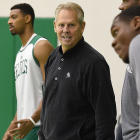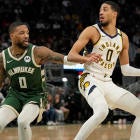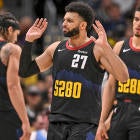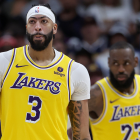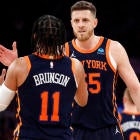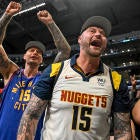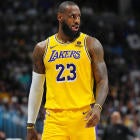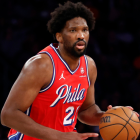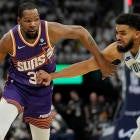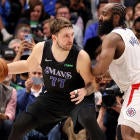The biggest thing to talk about from the NBA trade deadline is something that didn’t happen. The Boston Celtics remain the NBA’s best thought engine now that Sam Hinkie has gone to Silicon Valley. President of Basketball Operations Danny Ainge meticulously approached his rebuild through two fronts: A) getting better in the immediacy through trades (Isaiah Thomas, Jae Crowder) and free agency (Al Horford), and B) acquiring a cachet of assets that can be used at a later date to acquire a star.
He entered the trade deadline with movable players in Avery Bradley, Crowder, Marcus Smart, Jaylen Brown, Amir Johnson’s expiring contract, Kelly Olynyk, Terry Rozier, their own 2018 pick, the right to the Nets’ first-round pick in 2017 (likely a top-3 pick) and 2018, and a handful of other picks they’d acquired.
In short, there was no offer they could not match, or top, if they so chose -- and making a big move would not in any way gut the roster, as is often the expense of trading for a star player. There was a real opportunity for Boston to go get a player like Jimmy Butler and still have enough talent and assets left over to remain a flexible, viable contender into the foreseeable future.
Instead. they left the deadline cold. No deals. No additions. Not a first-round pick for Andrew Bogut. Not a blockbuster for Paul George or Jimmy Butler. Same team as they had before, a darn good one, but not one that can realitstically compete for a title. The Celtics walked into the deadline as the No. 2 team in the Eastern Conference and exited all the same. They still have the rights to the Brooklyn Nets’ first-round pick in 2017 and 2018. They still have young prospects and stars to build around.
But was standing pat the right move?
Let’s explore this a bit.

THE CONSENSUS
Generally speaking, folks are supportive of GM Danny Ainge hoarding all his picks and players like Gollum with the One Ring. I think it’s important to kind of review what’s been said. All of these columns are worth your time in reading in full:
Zach Lowe of ESPN had probably the best breakdown, laying out all the reasons why paying through the nose for Jimmy Butler or Paul George didn’t make sense, and outlining that there’s risk in doing nothing as well.
The Celtics are fine. They are the envy of the league, really. They are a good team now, and they might pick in the top three of the next two drafts. That is insane.
But it guarantees them nothing. Getting Butler wouldn’t have guaranteed them anything either, beyond the security of having him on the team. It’s fine for Boston to have stood pat. These are hard choices. There are more coming. Boston has to get some big ones right.
Source: Zach Lowe on Boston Celtics at the trade deadline - NBA.
Tom Ziller of SB Nation actually applauded Ainge for not making a move just for the sake of doing so.
These assets will all be there in June, once we better understand just how good the Celtics are. It is quite clear the team is better than it was last season — it turns out Al Horford is good — and the playoffs should bear that out. If the playoffs end and it’s clear Boston is far away from truly contending for a championship, Ainge will be able to determine whether adding another very high pick or flipping assets for realized talent will best help their chances.
Boston has the luxury of time. There is no ticking clock creating pressure. That doesn’t mean this will all work out perfectly — things rarely do in the NBA or anywhere on this brittle, dark world — but the Celtics are still set up as a model franchise without swinging a big deal. Urgency is a constraint created by intractable outside forces. What is there to pressure the Celtics but their own aims?
Nothing, and so the Celtics did nothing. For now.
Source: The Celtics didn’t trade for a big star again. They’re still the envy of the NBA - SBNation.com.
The Vertical’s Chris Mannix, who does work for CSN New England on the television side, reinforced the idea that not only was not making a trade the right move, but that it won’t wind up mattering because eventually, there will be a deal, and a big one:
A trade is coming eventually. Oh, you will hear a lot about Fultz, Washington’s freshman point guard, about his offensive prowess, about how a Thomas-Fultz backcourt could terrorize the East for years to come. But Boston isn’t going to waste Thomas’ prime years grooming a replacement, and at 30, Horford only has a few prime years left. Celtics president Danny Ainge has built a team that is one LeBron James turned ankle away from being a conference contender, and he won’t waste an opportunity to construct a post-James heir. A star will come available, be it George, Butler or someone else, and Trader Danny will be ready to pounce.
Besides, the best trades are often the ones you don’t make, and Boston knows this well. In 2015 the Celtics were willing to part with four first-round picks — including one of the Nets’ — to move up in the draft to nab Justise Winslow. Charlotte, picking ninth, passed and drafted Frank Kaminsky. Winslow went a pick later, and while he has emerged as a solid player, would anyone do that deal today? Boston’s pool of assets is too deep for someone not to come calling. The hunt for another star may have stalled on Thursday. But it’s far from over.
Source: Why standing pat was the right move for Celtics
The Ringer’s Bill Simmons, a huge Celtics fan, was able to justify why the Celtics kept the powder dry:
They couldn’t have played it any other way — don’t they have a better chance to dominate the 2020s in the next few years? If they strike oil in the lottery, great. If they can circle back and make another run at Butler or George (or someone else) in a situation where they become available in June, great. If they keep the pick and sign Gordon Hayward, great. Short-term contention coupled with the Great And Promising Unknown always trumps a Panic Blockbuster Overpay … right?
Source: The Post-Trade-Deadline Mailbag
Simmons wasn’t the only one at the Ringer who felt that way. Jason Concepcion wrote that because of the Warriors and Cavs, there wasn’t really a point in Ainge pushing his chips in.
Do the Celtics plus Butler or George upend the Cavaliers in May? Maybe. What about the Warriors in June? The future is an undiscovered country, but, I think we can fairly say “nah.” The Nets have the worst record in the league, and their pick will likely have a 25 percent chance of returning franchise-altering talent. The Celtics have a great coach, a solid group of players who can be moved as needed, and a realistic shot at the NBA Finals, all without relinquishing the Nets’ future draft picks.
Source: LeBron and Steph Ruined the Trade Deadline.
Barstool Sports was also willing to buy the logic Danny Ainge sold later that there wasn’t a deal worth doing.
Essentially the Celtics are playing with house money. If they want to see how far this team can go as is, utilize the picks, and see what happens down the road, who’s to say that’s not the right move? This team is still pretty (expletive) good, still a 2 seed, and hasn’t even had a long run of their core guys together. There is no reason to think they still can’t snag that home court advantage in Rd2 (if they are able to get past one round), and I’m not ready to say it’s a forgone conclusion they lose that series. I think we are all in agreement this team, even if they made some of these big star trades doesn’t get them past CLE, so why not stay the course and who knows, maybe you get to the ECF anyways.
The goal of this season has always been to make progress and show you are a viable destination to good free agents. That’s still happening. At the end of the day it sucks all that fun on Twitter was for nothing, but the Celtics are still in a great place and I don’t think we should lose sight of that.
Source: The Celtics Did Nothing…Just Like We All Expected - Barstool Sports.
So you’re probably noticing a pattern here, where pretty much everyone agreed that Ainge did the right thing. This is in part due to sound logic and in part due to a countering of fan and Twitter reaction. Ainge’s unwillingness to part with assets and to keep waiting for that perfect deal to come along has been a running joke for literally years.
But those columns break down into a few central concepts:
- The Celtics did not have to make a deal.
- The Celtics are still in such a great position afterwards that it makes the inaction a sound decision.
- Boston is better off keeping the 2017 Nets pick.
- The asking price for Butler and George was too high, and would have left them too short-handed.
- None of these moves would have put the Celtics over the Cavaliers (or Warriors) this season, so the effect of the deal is really limited, and the cost would have actually hurt their chances of reaching or winning the Finals.
- The Celtics aren’t under any pressure to do a deal, so any criticism of their decision is flawed.
And these are all good points. The Celtics are still in great shape, and there’s plenty of reason to feel great about their future. How many teams would want to be in their position, the 2-seed in the East with the likely No. 1 pick?
Trying to establish an actual position on these things is complicated. It’s a sticky situation the Celtics have found themselves in, and honestly, hindsight is what’s going to decide this thing. If the Celtics pull off a sweetheart deal, the kind Ainge has become accustomed to after winning the Kevin Garnett 2007 trade, the Rajon Rondo trade, the Isaiah Thomas trade, and the KG-Pierce 2013 trade, then waiting was correct. If they miss their shot, this team has a disappointing playoff run, the draft pick slips to No.4 or the player doesn’t wind up transformational, and they can’t make that sweetheart deal, then it’s a failure. And that’s kind of unfair on both ends.
When evaluating the logic of the decision not to make any deals, I keep returning to one word. Time.

THE CLOCK ON THE WALL
Here’s the question you have to start with: Are the Celtics in a better position now than they were last Wednesday, in pursuit of a title?
Note that this is not “are they in a bad position now?” We answered that, they are still in a great position. And as was noted on the Lowe Post podcast with Brian Windhorst and Kevin Arnovitz, the availability of Jimmy Butler and Paul George did not expire. They are not in a bad position.
But are they in a better position than they were on Wednesday? It’s hard to argue that they’re in a better spot, and they even be a little worse off, if still fine. Here’s why.
The Players
Amir Johnson (unrestricted free agent), Jonas Jerebko (unrestricted), Kelly Olynyk (restricted free agent) are all up this year. But they’re all replacable, that’s fine.
Next year, however, here are the Celtics players going into free agency: Isaiah Thomas (unrestricted -- going to expect the max), Avery Bradley (unrestricted -- going to expect a massive payday), Marcus Smart (restricted). That is a lot of money coming up. One of the listed reasons for why Boston didn’t have to give assets is that they can just pursue stars -- notably Gordon Hayward -- in free agency. (We’ll come back to the Hayward thing in a minute.) If they sign Hayward to a max, and then presumably sign Thomas to either a max extension or new max contract, the team is looking at being cap-strapped and tax-heavy, provided they keep any significant level of a supporting cast and that’s before looking at Smart and/or Bradley.
So you would think it would be good to figure out a plan before those kinds of decisions have to be made. Now, that decision is still tough if they add George (unrestricted in 2018) or Butler ($58 million total over three years left with a player option in the final season). But again, we return to the idea of time. Expiring contracts have drastically reduced in value since the 2011 CBA. Deals are up faster, now, with all of the contracts adjusted to a truncated timeline. What were three-year deals are now one or two. What were six-year maxes are now five years. And with the money going up, teams don’t need, or even want, deals which merely clear cap space.
If Ainge had dealt Bradley or Smart (or, sure, Thomas) before the deadline, teams would have had the rest of this season, and conceivably the playoffs, to evaluate them, and then all of next season to figure out what to do with them long-term. Now, teams will get at most a season. And they have to be prepared to then pay a considerable amount for them (provided that Smart will generate the level offers as a restricted free agent that he should), after giving up assets to acquire them. You can’t give up Paul George, have Avery Bradley be a key part of your return package, and then watch him walk, even if he wasn’t the biggest piece of the deal. You can’t deal a quality role player for Bradley and then watch him walk. So for those players, you get a truncated timeline for evaluation before tying yourself to them.
That lowers the value of them as assets, so perhaps the longer Boston hold onto these guys the more their bargaining power goes down.

The Picks
The Nets’ picks are the ones that are most nebulous. If the Nets win the lottery and net Boston the No. 1 pick (which they have a 25 percent chance of doing right now), the value goes up. Knowing that the pick is, in fact, the No. 1 is more valuable than a pick that could be anywhere between 1 and 4. If the lottery doesn’t go their way, and it slips to No. 3 or No. 4, then obviously, it loses value. It could go either way.
Trading the pick now is safest, because while teams might not pay top price for it given that it could end up being a pick outside the top 3, they will certainly pay something significant for the pretty good chance that it could be the top pick. Once that’s off the table, after the lottery, should it not go Boston’s way, you’ve just lost a ton of value.
One thing to consider, though. Let’s say you’re a team looking to deal a star, and the Celtics get that No. 1 pick. Three of the top five projected first-round picks on both CBS Sports and Draft Express are point guards. If you’re that team talking to Boston, and you know that Boston can’t really keep Isaiah Thomas, Marcus Smart, and Markelle Fultz, Lonzo Ball, or Dennis Smith and still have enough minutes for them, how do you react in deals? The alternative No. 1 is Josh Jackson from Kansas... who plays the same position as Jae Crowder and phantom free agent Gordon Hayward. So on paper, there isn’t a ton at the top of this draft that really helps Boston in the immediacy, and teams could factor that in in sort of strongarming Boston into a deal.
Now, there are a lot of ways to manage this. Trade Smart for a role player who helps, add Fultz, bring him up behind Thomas, and deal with that sticky wicket later. Again, “oh, no, we have a top-10 MVP candidate and the No. 1 pick in the draft who may be a transformative player,” is not really a terrible situation. But if you’re dealing with Boston, you can go in and say “dealing that pick is more beneficial to your plan than not dealing it.”
Then there’s what happens when that pick turns into a player. The minute you draft Fultz, every team that has a star point guard they’re committed to is off the board. That doesn’t apply to Chicago or Indiana, but it removes a lot of teams from bidding consideration. And the idea of Fultz (or whoever) is greater than the actual player; that’s true for literally any-pick-to-player comparison. The minute he steps foot on the Vegas floor for summer league, he’s a real player with weaknesses, inexperience, injuries, question marks. That’s why draft night is maybe the steeper cliff for Ainge. The dip from Wednesday to now is a “things aren’t quite as sweet as they were.” The dip from now to the day after the draft is significant, and the dip increases every day through the season as you get closer to Smart and Bradley’s free agency.
THE CONTENTION
The Celtics are probably going to make it out of the first round. Any of the teams in the 5th through 7th spots they would face don’t match up well with them, Boston is 6-2 vs. Atlanta, Chicago, Indiana and Detroit this season. Making the second round constitutes progress. People tend to overlook the fact that this Celtics core has yet to win a first-round series. After that, though, is where things get dicey. Boston is 2-6 vs. the Cavaliers, Raptors and Wizards this season.
If they fail to make it out of the second round, to even reach a matchup with Cleveland, how “close” are they? If they face the Cavs in the second round, or even the conference finals, and get wiped out, where are they really at? Bear in mind that the Celtics hit the deadline when they were playing their absolute best basketball of the season. Maybe that will hold. There’s also the possibility of playing the Cavs close, or that LeBron James suffers an injury and they slip past anyway.
There are positive outcomes in these scenarios as well. But even then, if they’re closer than they thought they were, does that mean they should have pulled the trigger?
THE MARKET EVOLUTION
Let’s go back to George for a second. There’s a lot of debate about how serious the Pacers were about dealing George. On Wednesday night, several league sources polled suggested a high level of skepticism about how intent Larry Bird really was on dealing him. However, the talks were undeniably there, and pretty clearly advanced to a serious stage at some point, even if the sides were far apart between Boston and Indiana. The rumored asking price for George involved more than three first-round draft picks, which is a crazy haul for any team, though Boston could deal three and still have leftovers.
Let’s say those talks were serious, but the Celtics wisely walked away from giving up too much with George’s looming free agency next year, and the widely leaked intention from his camp to only consider the Pacers or Lakers as a free agent. Since the deadline, George has made it clear he wasn’t happy with how things were handled, and he wasn’t exactly a happy camper before all the trade talk. On the Lowe Post podcast, Brian Windhorst referred to this summer as “the summer of George.” If George has real intentions of walking if the Pacers can’t find a way to being a contender again (and that path is imperceptible at this point), then guess what?
The Celtics aren’t going to be the only team invested in going after George.
Team situations change, sometimes dramatically. It’s true that the Celtics might get a better deal in June or July, or September, than they would have gotten on Thursday, because the pressure will ramp up on the Pacers. But it’s also true that things could get tougher because more teams will start circling the blood in the water. The Pacers’ asking price for the Nuggets was too much on Thursday, but they, along with a host of other teams, are always re-evaluating their positions.
Basically, Boston’s ability to say “no” to offers and wait for their leverage to improve could just as easily backfire as bear fruit. That’s not to say either is a given, it’s to say that time is something the Celtics have to keep in mind.
THE FREE AGENCY TANGENT
It is a non-secret that Boston has interest in Gordon Hayward in free agency. Hayward will demand a max contract; he’s an All-Star, healthy in his prime who plays both ways and helps your team win. But signing Hayward pretty much guarantees that Jae Crowder (who was insulted at fans cheering for him the last time the Jazz were in Boston) will want out. So you’re losing that asset if you add Hayward. Does Hayward make them a real threat to Cleveland?
And, oh, by the way, the Jazz are looking at a serious playoff run and will have every intention of keeping Hayward who they have supported and nurtured along the path of his career. And they will be able to offer him the most money.
If they sign another big name free agent (let’s imagine something crazy happens with Blake Griffin, say), then the cap space problem stated above is in play again, and now your timeline is truncated, though. You don’t sign Blake Griffin to then turn around and build around a rookie.
All of these decisions have ramifications.
THE POINT
So after all this, here’s what we know.
- The Celtics, yes, are still in a great position to cash in later and build a major contender.
- They are in a “tough spot” that about 75 percent of the league would love to be in.
- They are still brimming with talent.
- They are probably not in as good a position as they were before the deadline.
- That position worsens after the draft, and then steadily gets worse the closer you get to next season’s trade deadline.
- Boston’s options are still wide-ranging, and their trade targets could become cheaper, but there could also be an evolving market for them.
So yes, it’s fine to say Danny Ainge did the right thing by not making a bad deal. Evaluating their current position, and the clock that very much does hang on the wall for them, does not mean they made a mistake. It means that the Celtics don’t have forever, and every pitch they watch go by means the pressure mounts for that next swing, with which, at some point, they have to go big or go home.













